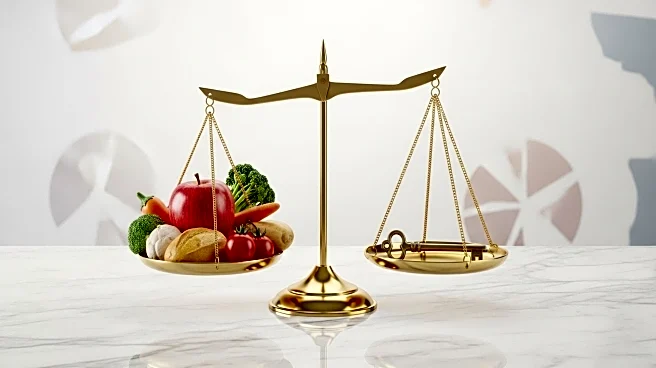What's Happening?
Israel's Supreme Court has ruled that the state must improve the nutritional provisions for Palestinian prisoners, stating that the current food supply fails to meet basic nutritional needs. This decision comes amid ongoing tensions and military operations in Gaza, where thousands of Palestinians have been detained since the conflict began in October 2023. The court's ruling follows a petition by human rights groups, including the Association for Civil Rights in Israel, which highlighted malnutrition and starvation among prisoners due to changed food policies. The ruling mandates the government to ensure adequate nutrition for prisoners, emphasizing the legal obligation to maintain a basic level of existence. Meanwhile, President Trump has issued a 'last warning' to Hamas, urging them to accept a ceasefire deal to release Israeli hostages held in Gaza.
Why It's Important?
The Supreme Court's decision underscores the ongoing humanitarian concerns within Israeli prisons, particularly for Palestinian detainees. This ruling could lead to improved conditions for thousands of prisoners, potentially easing tensions and addressing international criticism of Israel's treatment of detainees. The broader conflict in Gaza continues to impact regional stability, with significant pressure on Israeli Prime Minister Benjamin Netanyahu to negotiate a ceasefire and secure the release of hostages. The humanitarian situation in Gaza remains dire, with reports of civilian casualties and calls for international intervention. The court's decision may influence public opinion and policy regarding the treatment of prisoners and the conduct of military operations.
What's Next?
The Israeli government is expected to implement the court's ruling, potentially leading to changes in prison policies and conditions. Human rights groups will likely monitor the situation closely to ensure compliance. On the diplomatic front, negotiations for a ceasefire and hostage release may intensify, with President Trump's involvement suggesting potential shifts in U.S. foreign policy towards the conflict. The international community may increase pressure on Israel to address humanitarian concerns and seek a resolution to the ongoing hostilities.
Beyond the Headlines
The ruling highlights ethical and legal dimensions regarding the treatment of prisoners and the responsibilities of states during conflicts. It raises questions about the balance between security measures and human rights, particularly in the context of prolonged military engagements. The decision may also influence future legal challenges and advocacy efforts by human rights organizations, potentially setting precedents for prisoner rights and state obligations.









